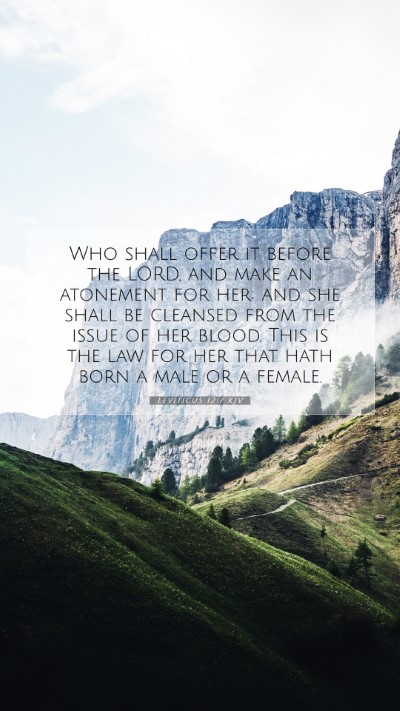Leviticus 12:7 - Summary and Commentary
This verse addresses the purification process for a woman after childbirth, emphasizing the role of offerings in restoring her status within the community. It highlights the importance of rituals and sacrificial practices in maintaining holiness according to Mosaic Law.
Overview of Leviticus 12:7
In Leviticus 12:7, we find detailed instructions regarding the sacrifice to be offered after a woman gives birth, specifically mentioning a lamb for a burnt offering and a young pigeon or turtle dove for a sin offering. This not only reflects the purification process but also touches upon the themes of sacrifice and atonement.
Interpretations from Public Domain Commentaries
- Matthew Henry's Commentary:
Henry notes that the offerings prescribed were not only an act of thanksgiving for the gift of life but also a means to atone for the 'original sin' that even childbirth symbolically brings forth. He emphasizes the importance of returning to the Lord in worship, acknowledging His sovereignty in human affairs.
- Albert Barnes' Notes:
Barnes elaborates on the significance of the offerings as required by the Law of Moses. He points out that the two distinct offerings—the burnt and the sin offering—illustrate the dual aspects of worship: honoring God and seeking forgiveness. This also signifies that although childbirth is a blessing, it is necessary to understand the need for cleansing due to human imperfection.
- Adam Clarke's Commentary:
Clarke provides an insight into the cultural implications of the rituals, explaining that they were part of the larger framework of the ceremonial law meant to instruct the people about purity, holiness, and community restoration. He notes that these offerings could vary based on the economic status of the individual, emphasizing God's consideration for the poor while upholding the law.
Detailed Meaning of Leviticus 12:7
This verse signifies a time of transition following childbirth, with the woman moving from a state of ritual impurity to one of purity through prescribed offerings. The necessity of a sin offering hints at the belief in original sin and the need for atonement in all life processes, including birth.
The offerings represent both a joy for the new life and an acknowledgment of the imperfections inherent in human nature. The lamb signifies total surrender and devotion, while the bird represents a more accessible offering for those who cannot afford the more substantial sacrifice, illustrating God's mercy and understanding toward all individuals.
Key Themes in Leviticus 12:7
- Purification: The process underscores the need for spiritual cleanliness before God, reflecting His holiness.
- Forgiveness: The introduction of the sin offering indicates a recognition of human sinfulness at every stage of life, not excluding the act of giving birth.
- Thanksgiving: The burnt offering, made available to God in worship, signifies gratitude for the blessings of life.
- Community and Law: Observing these practices binds the individual to the larger community of Israel and its covenantal relationship with God.
Cross References
- Leviticus 15:19-30 - Further purification laws regarding bodily discharges.
- Numbers 6:9-12 - Instructions on offerings related to the Nazirite vow, showcasing the importance of purity.
- Luke 2:22-24 - The presentation of Jesus at the temple, fulfilling the purification laws of childbirth.
Application of Leviticus 12:7 in Modern Life
Understanding Leviticus 12:7 provides valuable insights for modern believers on the significance of purity, thankfulness, and recognition of God's forgiveness in everyday life. It encourages individuals to reflect on their own spiritual state and the importance of offering gratitude to God amidst life's changes, including birth and family growth.
Furthermore, this passage can guide Bible study groups in discussions about the relevance of Old Testament laws in contemporary faith practices, helping participants to see how historical context informs their understanding of Scripture today.


